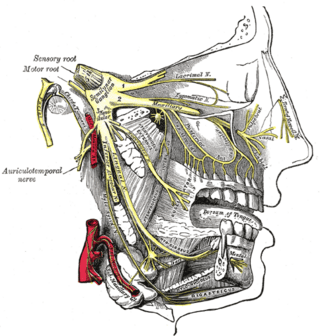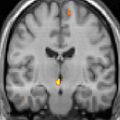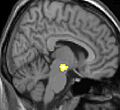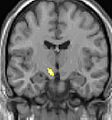Cluster headache facts for kids
Quick facts for kids Cluster headache |
|
|---|---|

Trigeminal nerve
|
|
| Classification and external resources | |
| Specialty | Neurology |
| ICD-10 | G44.0 |
| ICD-9-CM | 339.00,339.01,339.02, |
| DiseasesDB | 2850 |
| MedlinePlus | 000786 |
| eMedicine | EMERG/229 article/1142459 |
| Patient UK | Cluster headache |
| MeSH | D003027 |
Cluster headache (often called CH) is a type of very bad headache. It causes strong pain on one side of the head, usually around the eye. People with cluster headaches often have other symptoms too. These can include a watery eye, a stuffy nose, or swelling around the eye. These symptoms usually happen on the same side as the head pain.
The name "cluster headache" comes from how the attacks happen. They tend to come in groups, or "clusters," over a period of time. People who have them feel very severe pain repeatedly. These attacks often happen at certain times, like every day for a few weeks. Scientists are still trying to find out what causes cluster headaches.
Even though there is no cure, doctors can sometimes help prevent these headaches. They can also treat the attacks when they happen. About 0.2% of people get cluster headaches. This means it's quite rare. More men tend to get them than women.
What are the signs of cluster headaches?
Cluster headaches are known for causing very intense pain. The pain comes in attacks that happen again and again. A typical cluster headache attack can last from about 15 minutes to three hours. Most attacks, about 75% of them, last less than an hour if not treated. The pain usually starts very quickly. Unlike migraines, there are often no warning signs before a cluster headache begins.
How does the pain feel?
The pain from a cluster headache is always on one side of the head. It is often felt around the eye, above the eye, or in the temple area. Sometimes, it can be in a combination of these spots.
The pain of a cluster headache is much stronger than other types of headaches. This includes even very bad migraines. People often describe the pain as burning, stabbing, drilling, or squeezing. It can feel like it's behind or near the eye. Many people say it is one of the most painful conditions they have ever experienced.
Images for kids
See also
 In Spanish: Cefalea en racimos para niños
In Spanish: Cefalea en racimos para niños
 | William L. Dawson |
 | W. E. B. Du Bois |
 | Harry Belafonte |







